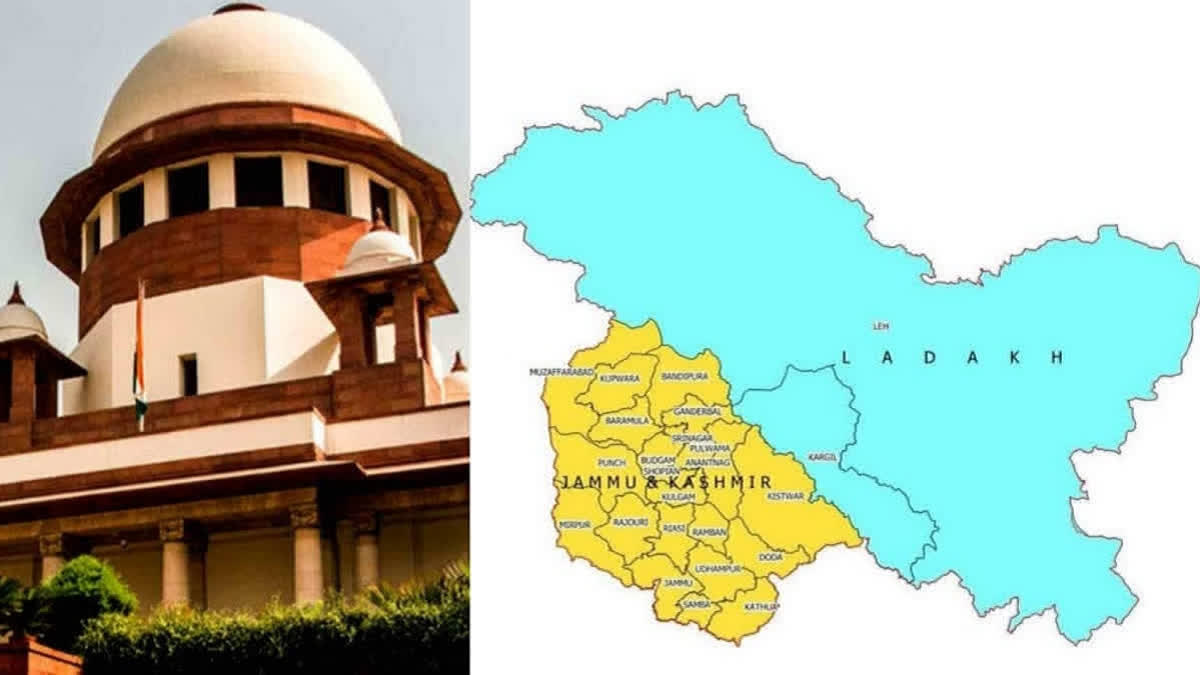New Delhi: In the ongoing hearing on Article 370 abrogation, the Supreme Court Monday observed that Article 35A created an exception under three areas -- employment under state government, acquisition of immovable properties, and settlement in the state -- and the introduction of Article 35A, virtually took away fundamental rights.
A five-judge constitution bench headed by Chief Justice of India D Y Chandrachud and comprising justices S K Kaul, Sanjiv Khanna, B R Gavai, and Surya Kant, is hearing a batch of pleas challenging the abrogation of Article 370, which bestowed special status on the erstwhile state of Jammu and Kashmir.
Solicitor General Tushar Mehta, representing the Centre, informed the court that a separate clause Article 35A has been challenged before the court and there are petitions pending. Mehta said despite living for decades together, no person outside J&K can acquire property, meaning thereby, no investment.
Chief Justice Chandrachud said, "See the 1954 order...it applied the entirety of Part III (dealing with fundamental rights)….therefore Articles 16, 19 applied…..you bring in Article 35A which creates an exception in 3 areas: employment under the state government, acquisition of immovable properties, and settlement in the state, leave aside scholarships…..Though Part III is applicable, in the same vein when you introduce Article 35A, you take away 3 fundamental rights: Article 16(1), the right to acquire immovable property which was then a fundamental right under Article 19(1)(f), Article 31, and third, settlement in the state which was a fundamental right under Article 19(1)(e)”.
The Chief Justice said, “The Constitution expressly made the provisions of Article 19 applicable, which would include these three rights and Article 16. By enacting Article 35A, you virtually took away the fundamental rights”.
Solicitor General Tushar Mehta, representing the Centre, said employment is also a right to life. The Chief Justice said, “What was taken was employment under state government, because what 35A did was it says conferring on such permanent residents any special rights and privileges or imposing upon other persons any restrictions, it does both things – it gives special rights to residents and can take away that right as far as non-residents are concerned”.
The Chief Justice said employment under the state government is expressed by Article 16 (1), which says there shall be equality of opportunity for all, under the state (which include the Union and as well as states). He said, “While on hand Article 16(1) was preserved, 35A directly took away that fundamental right and granted immunity to any challenge….likewise Article 19, which recognizes right to reside, settle in any part of the country…..all three fundamental rights were essentially taken away by 35A….power of judicial review was taken away”.
Mehta said, “it continued till 2019, and power of judicial review was also taken away, so it is beyond 9th Schedule….please look at the matter from the point of view of people of Jammu and Kashmir”.
Defending Centre’s decision, Mehta said the entire Constitution is now applicable to J&K, and brought J&K people at par with rest of their brothers and sisters, and also enabled all welfare legislations are applicable.
Mehta said, “till now people were convinced by those who were supposed to guide them that this is not a hindrance in your progress. This is your privilege; you fight and nobody can take away Article 370 from you…that is the most unfortunate part. Two major political parties are before your lordships defending 370, including 35A….”.
Mehta contended after 35A went, people got their fundamental rights and added that he would cite several provisions which were working against the interest of the J&K people, but they were convinced and they have realized what they have lost. Mehta said, “Now 35A is not there, investments are coming….now policing with the Centre, tourism has started….there were no big industries, there were small industries, cottage industries. The source of income was tourism, now tourism has started”.
Mehta said, "Now, 16 lakh tourists have come. New hotels are coming up which gives employment to a large number of people - from tangawala to officials!" On August 5, 2019, the Centre abrogated the special status of Jammu and Kashmir, enabled by Articles 370 and 35A of the Constitution, by abrogating these provisions and bifurcated it into two Union Territories (UTs) of J&K and Ladakh. Soon after the move, several parties challenged it in the Supreme Court.
Also read: 'Means have to be consistent with ends': SC to Centre on abrogation of Article 370



